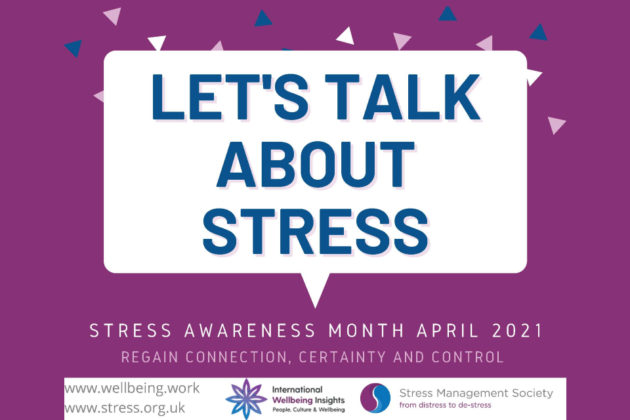Let’s talk about stress
As we come to the end of Stress Awareness Month, colleagues from across the Government Communication Service (GCS) reflect on how they manage their stress levels.

Acknowledgement
Michał Ratyński, Communications and Project Coordinator, Professional Standards Team:
“I try to get the basics right. There is nothing more important to reduce stress than having a good sleep, a healthy diet and exercise. Secondly, I stop and think about whether the problem at hand is really that serious. Very often I realise that it rather reflects my anxious mind than the objective reality. Thirdly, I remind myself that having a bad day is a universal human experience. This helps me not to beat myself up for too long.”
Leanne Ehren, Head of Communications Hub – Emergency Services Mobile Communication Programme (ESMCP), Home Office:
“A key factor for me in managing stress successfully is acknowledging it. Sometimes, we just can’t avoid situations that cause us stress, so I find if I take notice of how I feel and acknowledge that I feel stressed – usually by journaling – it enables me to then take steps to get me out of that place. The steps I then find helpful are:
1) acknowledging what is in or out of my control that’s causing me stress,
2) making a plan to tackle those things in my control,
3) doing something completely different and enjoyable to take my mind off those things that are not in my control.”
Jamie Mills, Senior Communications Manager, National Infection Service:
“It sounds clichéd, but when you’re feeling overwhelmed it really does help to talk to someone – just speaking to my manager made me realise I was having a normal reaction to an intense workload. It gave me some perspective and I felt less stressed knowing that I wasn’t alone.”
Staying active
Rachel Forster, Head of COVID Communications, HM Revenue and Customs Communications (HMRC):
“Walking chats have been a lifeline for many of us to help with stress relief. It allows us to get outside for our wellbeing while juggling busy diaries, and the quality of conversation is much better too as we’re often more relaxed when outside, which also has the bonus of encouraging creative thinking.”
Lucy Fenn, London Area Communications Manager, Crown Prosecution Service (CPS):
“I stretch my stress away through daily yoga. It is cliched for a reason-it works! A bad day doesn’t necessarily get reversed after a downward dog, but when you concentrate purely on the breath and the body, the mind quietens down. Part of the magic is that you can do it wherever, whenever. On the small scale: neckrolls at the desk in front of your laptop. On the larger scale: book a class and wear something stretchy. Whatever you need, it’s there for you… I’ve even been known to take refuge in the bathroom at work before a big meeting for a couple of standing sun salutations!”
Noita Sadler, Head of External Affairs, Department of Health and Social Care (DHSC):
I find that reserving time for yourself in the morning or your lunch hour helps to manage stress levels. I usually opt for a run, a long walk or a workout video with an overly upbeat instructor. I encourage others to take time out for whatever works for them and to make it priority.
Being organised
Caroline Perry, Communications Manager, Department for Transport
“When I’m in work, I manage stressful situations by leaving space to collect my thoughts and figure out the actions I need to take. I write a list of all the tasks so I can see everything clearly on the page.
If I’ve had a stressful day and want to switch off, I find that going for a walk while listening to a podcast, or reading, helps me to take my mind off what I’ve been doing and reset!”
Matt Dolman, Head of Communications, GCS Flex:
“Managing my time and helping others to do the same is a key part of how I manage stress. Things like giving advance notice on tasks, setting clear deadlines and briefs, and considering whether that Zoom meeting could instead be a three line email. The best strat comms teams are the ones which make everyone else’s lives easier.”
Kathryn Awde, Senior Campaigns Manager, Network Rail:
“I’ve learnt to appreciate some ‘pressure’ but to feel in control and prevent ‘pressure’ becoming ‘stress’ I like to plan! Every Monday I set out what I need to get done on each day of the week at work then adjust each morning if necessary (there’ll always be a curveball!)
Key to all of these is breaking things down into bitesize chunks rather than panicking about the bigger picture and feeling like you can’t see the finish line!”
Efetive Eguko, Deputy Head of Campaigns, Department for Culture, Media and Sport (DCMS):
“Stressors vary from person to person. I believe the first step is for everyone to honestly identify factors that trigger stress. For me, it is work overload. I have found out that a to-do list is a powerful tool that helps me manage my stress levels. With the to-do list, I am able to map out and prioritise the tasks to be delivered. Having this clarity helps me manage my own expectations and that of other stakeholders.”
Find out more on the Stress Management Society’s website.
- Image credit:
- wellbeing.work / stress.org.uk (1)
